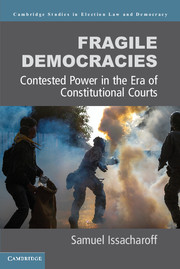Book contents
- Frontmatter
- Contents
- Preface
- Introduction: The Burden of Modern Democracy
- PART I MILITANT DEMOCRACY
- PART II COMPETITIVE DEMOCRACY
- 6 Giving Up Power
- 7 The Promise of Constitutional Democracy
- 8 Transition in South Africa
- 9 The Era of Constitutional Courts
- 10 The Constitutional Bargain
- 11 Can Law Protect Democracy?
- 12 Constitutionalism in the Time of Fragile Democracies
- Epilogue: Democratic Objectives
- Index
12 - Constitutionalism in the Time of Fragile Democracies
from PART II - COMPETITIVE DEMOCRACY
Published online by Cambridge University Press: 05 July 2015
- Frontmatter
- Contents
- Preface
- Introduction: The Burden of Modern Democracy
- PART I MILITANT DEMOCRACY
- PART II COMPETITIVE DEMOCRACY
- 6 Giving Up Power
- 7 The Promise of Constitutional Democracy
- 8 Transition in South Africa
- 9 The Era of Constitutional Courts
- 10 The Constitutional Bargain
- 11 Can Law Protect Democracy?
- 12 Constitutionalism in the Time of Fragile Democracies
- Epilogue: Democratic Objectives
- Index
Summary
History rewards cautious judgments. Had this book been written a half-century earlier, at the height of the postwar consociationalist experiments, a certain triumphalism would no doubt have accompanied the description of negotiated power sharing among rival ethnic or religious groups. That enthusiasm would no doubt have waned as civil wars ravaged Cyprus, Sri Lanka, Ivory Coast, and other bastions of negotiated accommodation of coordinated political solutions.
Twenty-five years have now passed since the fall of the Berlin Wall and a renewed period of democratic euphoria. The historic end of the Cold War brought with it a heralding that the epochal wars of the twentieth century had at last been concluded. Democracy was triumphant. Its ideological challengers of fascism and communism were defeated. The market was ascendant in China and the few outliers in North Korea or Cuba were simply rogue states that were ill suited to resist the demands of their populations for freedom and improved material standards of living.
With the fall of the Soviet Union, the proxy wars of the great powers ended, leaving the client states of East and West vulnerable to popular demands for liberty and democratic rule. In short order, apartheid fell in South Africa, democracy took root in the Pacific Rim, and Mexico recovered competitive elections. Entire regions were transformed, as with the stabilization of civilian rule in Latin America. Even in sub-Saharan Africa, long the bastion of strongman rule, there was actual rotation in office for the first time in the postcolonial period.
History was on the march, and this was a glorious Whiggish account, with perhaps a touch of Dr. Pangloss thrown in for good measure. The Hegelian unfolding of events had revealed the “end of history,” as proclaimed by Francis Fukuyama: “What we may be witnessing is not just the end of the Cold War, or the passing of a particular period of post-war history, but the end of history as such: that is, the end point of mankind's ideological evolution and the universalization of Western liberal democracy as the final form of human government.”
- Type
- Chapter
- Information
- Fragile DemocraciesContested Power in the Era of Constitutional Courts, pp. 269 - 278Publisher: Cambridge University PressPrint publication year: 2015

